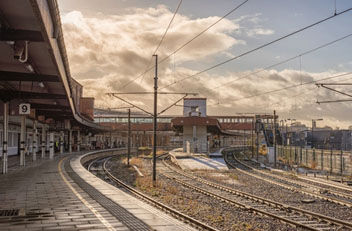More than 50,000 railway workers will walk out later this month in three days of national strike action, potentially heralding months of disruption.
The RMT union said it will shut down the country's rail network on 21, 23 and 25 June, which it described it as the biggest dispute on the rail network since 1989, ‘due to the inability of the rail employers to come to a negotiated settlement with RMT’.

A deserted rail platform, York, January 2022
It said that Network Rail and the train operating companies (TOCs) have subjected staff to multiyear pay freezes and now plan to cut thousands of jobs, which it said ‘will make the railways unsafe’.
The union added that despite intense talks with bosses, it has not been able to secure a pay proposal or a guarantee that there will not be compulsory redundancies.
General secretary Mick Lynch said the RMT was open to 'meaningful negotiations' with rail bosses and ministers, ‘but they will need to come up with new proposals to prevent months of disruption on our railways’.
He said: ‘Railway workers have been treated appallingly and despite our best efforts in negotiations, the rail industry with the support of the government has failed to take their concerns seriously. We have a cost-of-living crisis, and it is unacceptable for railway workers to either lose their ‘jobs or face another year of a pay freeze when inflation is at 11.1% and rising.’
The Rail Delivery Group (RDG), which represents Network Rail and the TOCs, said it ‘wants to work to find a solution that will avoid strikes and achieve a fair deal for passengers, taxpayers and rail staff’ but said reform is necessary to secure a long-term future for the railway, which it said ‘is taking more than its fair share from other public services’.
Chair Steve Montgomery, said: 'No one wins in the event of a strike. Staff lose pay, the industry loses vital revenue making it harder to afford pay increases, and passengers and businesses are disrupted.
‘While we will keep as many services running as possible, sadly if this action goes ahead, significant disruption will be inevitable. We therefore urge passengers to plan their journeys carefully and find alternative ways to travel during the strike period where possible.’
The RDG added that with passenger numbers only at around 75% of pre pandemic levels, the Government cannot continue to commit to increased levels of funding indefinitely and that the industry needs to become more efficient and be brought up to date with how people work and travel today.
In fact, Department for Transport figures show that in the week before last week’s half-term holiday and bank holidays, passenger numbers were between 86% and 92% of pre-pandemic levels, with similar figures for the previous week.
Darren Caplan, chief executive at the Railway Industry Association, said: ‘These figures show that people are returning to rail in ever greater numbers. This is not just leisure travel coming back – commuter travel, including Mondays and Fridays, has been steadily increasing too.’
The RMT said its London Underground members will take strike action on 21 June, the first day of the national rail strike, in a separate dispute over pensions and job losses.
Register now for full access
Register just once to get unrestricted, real-time coverage of the issues and challenges facing UK transport and highways engineers.
Full website content includes the latest news, exclusive commentary from leading industry figures and detailed topical analysis of the highways, transportation, environment and place-shaping sectors.
Use the link below to register your details for full, free access.
Already a registered? Login